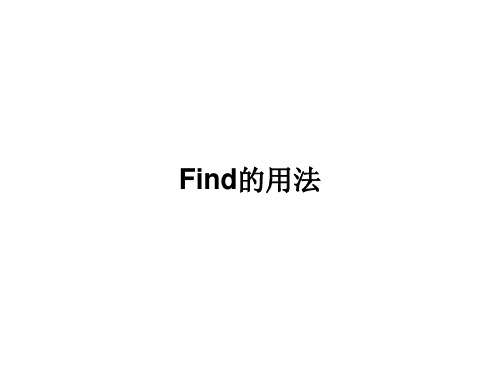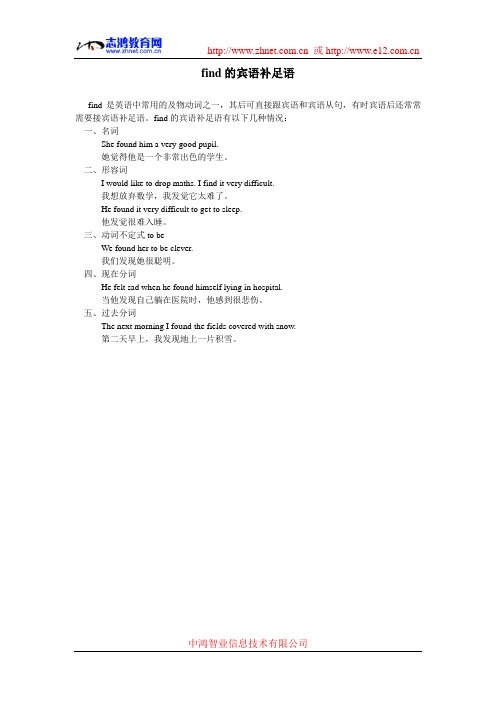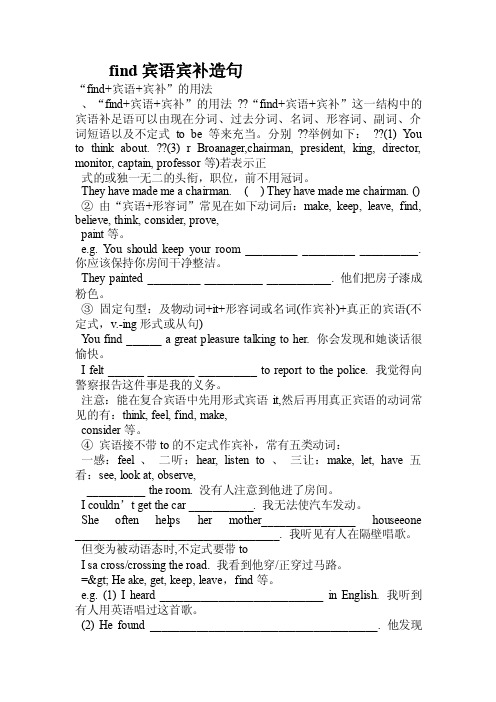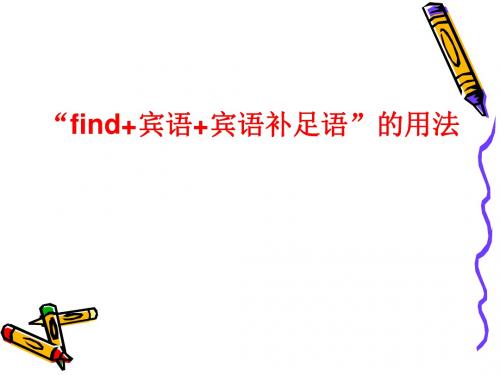find 宾语 宾语补足语”的用法
find的用法

find的用法find可作为及物动词、不及物动词和名词使用。
用法包括:1、表示“找到”,其后可接双宾语;若双宾语交换位置用介词for引出间接宾语。
如:Can you find me a hotel?=Can you find a hotel for me?你能给我找一家旅馆吗?We found him a good job.=We found a good job for him.我们为他找了份好工作。
比较下面一句(found后为复合宾语):We found him a good teacher.(=We found that he was a good teacher.)我们发现他是位好老师。
2、表示“发现”时,其后可接各种形式的复合结构:(1)宾语+名词作宾语补足语。
如:You’ll find it a difficult book.你会发现它是一本难懂的书。
有时可在宾语补足语前加上to be。
如:You’ll find it to be a difficult book.你会发现它是一本难懂的书。
(2)宾语+形容词作宾语补足语。
如:He found the room empty.他发现房间是空的。
I found the book easy.我觉得这书读起来比较容易。
有时可在宾语补足语前加上to be。
如:We find the story(to be)very interesting.我们发现这个故事很有趣。
(3)宾语+副词作宾语补足语。
如:Did you find her in?你发现她在家吗?I went to her house but I found her out.我到她家发现她不在家。
用作宾语补足语的副词通常只能是in,out,up,down,upstairs,downstairs等表示处所的副词小品词,而不能是其他普通副词。
(4)宾语+不定式作宾语补足语。
如:He found the patient to be a small boy.他发现病人是一个小男孩。
find的用法

I found him standing at the door.
我发现他正站在门口。
(6) 宾语+过去分词 He found the door locked. 他发现门锁上了。 He found the city much changed. 他发现这个城市发生了巨大的变化。
(7) 宾语+介词短语 We found her in tears. 我们发现她在哭泣。
Find的用法
1. 表示“找到”,其后可接双宾语;
Can you find me a hotel? 你能给我找一家旅馆吗?
We found him a good job. 我们为他找了份好工作。
2. 表示“发现”时,其后可接各种形式的复合结构: (1) 宾语+名词
You’ll find it a difficult book. 你会发现它是一本难懂的书。
“find+it(形式宾语)+adj(宾语补足语)” I find it easy to get on with her. 我发现她很容易相处。
I found it interesting being back at school again. 我发现再次回到学校很有意思
(2) 宾语+形容词 He found the room empty. 他发现房间是空的。
(3)宾语+副词
I went to her house but I found her out. 我到她家发现她不在家。 (4) 宾语+不定式(原来是....) He found the patient to be a small boy. 他发现病人原来是一个小男孩。 (5) 宾语+现在分词
宾语补足语find_用法教学提纲

The old man found his hometown much changed. 这位老人发现自己的家乡有了很大的变化。
8 Find+that+从句
We found that he was wrong。
动词+宾语+宾语补足语 find + 名词 +n. /adj. /adv/介词短语 doing /done /to be/that从句
3、我认为有可能用另一种方法解题。 I consider it possible to work out the problem in another way.
4、我认为与那个人谈话是无益的。 I thought it no use talking with that man.
5、他清楚地表示他希望我能再呆一周。 He made it clear that he wanted me to stay for another week.
2.汉译英练习: 1)她发现他 的话很难懂。 She found it difficult to understand what he said. 2)我想不值得去。 I don’t think it worthwhile to go.
3)他认为帮助他们很重要。 He regard it as important to help them. 4)我认为最好有戒备。 I thought it best to be on guard. 5)我规定自己每天跑步半小时。 I made it a rule to run for half an hour every day. 6)他感到有责任向她提一提这件事。 He felt it his duty to mention this to her.
find的宾语补足语

或
中鸿智业信息技术有限公司
find 的宾语补足语
find 是英语中常用的及物动词之一,其后可直接跟宾语和宾语从句,有时宾语后还常常需要接宾语补足语。
find 的宾语补足语有以下几种情况:
一、名词
She found him a very good pupil.
她觉得他是一个非常出色的学生。
二、形容词
I would like to drop maths. I find it very difficult.
我想放弃数学,我发觉它太难了。
He found it very difficult to get to sleep.
他发觉很难入睡。
三、动词不定式to be
We found her to be clever.
我们发现她很聪明。
四、现在分词
He felt sad when he found himself lying in hospital.
当他发现自己躺在医院时,他感到很悲伤。
五、过去分词
The next morning I found the fields covered with snow.
第二天早上,我发现地上一片积雪。
宾语宾语补足语的用法

2.我发现我的新同学很容易相处。 3.人们发现许多建筑物在地震中毁灭。
difficult (1)You will find it a ________(difficulty) book. interesting (2)The youth found it ________(interest) to think about this problem. (3) When he came to himself, he found himself surrounded ____________(surround) by a group of boys. in (4) I hope to find you ______ better spirits when we meet again. (5) A cook will be immediately fired if he is found _________(smoke) in the kitchen. . smoking
现在分词表主动进行
7.find+宾语+宾补(过去分词) The old man found himself stolen in the market. 这位老人发现自己在市场被偷了。
过去分词表被动完成
“find+宾语+宾补”这一结构中的
宾语补足语可以由现在分词ing、
过去分词P.P.、形容词、
名词、副词、介词短语、
. He found a boy ________(lie) on the grass. lying • He found a boy ________(beat) blue and black beaten on the way home. standing • He found himself _______(stand) in the water when he work up. buried • He found himself ________(bury) in the sand when he woke up. lost • He found himself ________(lose) in the sea when he woke up. find(found) + 宾语 + 宾补 lost • He found his keys _________(lost) when he find oneself\sb\sth doing 发现……正在做某事 woke up. be found doing sth 被发现正在做某事
find的用法和句型

find的用法和句型一、find的用法和句型在英语中,动词"find"是一个常用而重要的动词,它用于表示找到或发现某人或某物。
本文将详细介绍"find"的用法和句型,并提供相关例句以帮助读者理解和应用。
1. "find"作为及物动词1.1 Find + 宾语 + 宾补当"find"后面跟随名词宾语时,可以通过添加宾语补足语来进一步描述该名词。
例句: I found him very helpful in solving the problem.(我发现他在解决问题方面非常乐于助人。
)1.2 Find + 宾语 + 形容词当"find"后面跟随名词宾语时,还可以通过添加形容词来描述对该名词所产生的感觉或印象。
例句: I found the movie captivating and thought-provoking.(我发现这部电影引人入胜且发人深省。
)1.3 Find + 宾语 + 不定式"Find"可与不定式连用,表示在某种情况下寻找到需要做某事的对象。
例句: I finally found a good book to read during my vacation.(我最终找到了一本值得我在假期里读的好书。
)2. "find"作为不及物动词当"find"后面没有宾语时,可用于表示发现或认为某事。
2.1 Find + 定语"Find"常与定语连用,表示发现某人或某物具有特定的品质、特征或状态。
例句: I find this book very interesting.(我发现这本书非常有趣。
)2.2 Find + it + 形容词 + to-infinitive"Find"后面接it作形式主语,而将真正的主语放在不定式中,表示所发现的是指定对象在进行某种行为时感到如何。
find发现的用法

find发现的用法(实用版)目录1.find 的词性和含义2.find 的常见用法3.find 的特殊用法4.find 的例句正文find 是一个英语单词,既可以作动词,也可以作不及物动词。
作为动词时,它的意思是“找到”,“发现”;作为不及物动词时,它的意思是“找到某物”。
find 的常见用法包括以下几个方面:首先,find 可以表示“找到”,后面通常跟宾语。
例如:I found my lost phone in the park.(我在公园里找到了我丢失的手机。
)其次,find 可以表示“发现”,后面通常跟宾语和宾语补足语。
例如:He found that he lost his wallet.(他发现他丢了钱包。
)此外,find 还可以表示“找到某物”,后面通常跟介词“in”和地点状语。
例如:I found a pen in my bag.(我在我的包里找到了一支笔。
)find 还有一种特殊用法,即用来表示“偶然遇到”。
例如:I found an old friend on the street yesterday.(我昨天在街上偶然遇到了一个老朋友。
)以下是一些 find 的例句:1.She found a new job after graduation.(她毕业后找到了一份新工作。
)2.He found a rare book in the library.(他在图书馆找到了一本罕见的书。
)3.They found a solution to the problem.(他们找到了解决问题的办法。
)4.I found a beautiful park near my house.(我在我家附近找到了一个美丽的公园。
)总的来说,find 是一个非常实用的单词,它在日常生活和英语写作中都经常用到。
宾语补足语find用法演示文稿

第十页,总共十八页。
2.汉译英练习: 1)她发现他 的话很难懂。
He made it clear that he wanted me to stay for another week.
第九页,总共十八页。
It用法练1
1.I felt ____ necessary to speak about our shortcomings. A. Me B. one C. that D. it 2. Do you consider it any good _______ again?
玛丽匆匆赶到那里,结果却发现他们都出去了。
4.find+宾语+宾补(介词短语)
When he woke up, he found himself in hospital. 当他醒来时,发现自己在医院里。
5.find+宾语+宾补(不定式)
They find the Chinese people to be happy
3、我认为有可能用另一种方法解题。 I consider it possible to work out the problem in another way.
4、我认为与那个人谈话是无益的。 I thought it no use talking with that man.
5、他清楚地表示他希望我能再呆一周。
宾语补足语find用法演示文稿
第一页,总共十八页。
英语词汇难点解析find的用法

英语词汇难点解析find 的用法find 的用法find + that + 宾语从句We found that only fifteen percent of our students exercise every day.我们发现只有15%的学生每天锻炼。
f ind + 宾语+ 宾语补足语的复合结构1. find + 宾语+ 名词(名词性短语)We have found her (to be) a very modern-looking woman.我们发现她是一位相貌十分摩登的女郎。
2. find + 宾语+ 形容词I found the room tidy.我发现这个房间很干净。
3. find + 宾语+ 现在分词I found her standing at the door.我发现她正站在门口。
辨析:no 与notno 可以作副词或形容词1. 作副词时常常单独使用,用在一般疑问句的否定回答中,与yes相对。
Haven't you got your driver's licence?No.你难道没有拿到驾照吗?没有。
2. 作形容词时修饰名词,作定语。
修饰单数可数名词时,相当于not a; 修饰不可数名词时,相当于not any.I have no pen = I don't' have a pen.我没有钢笔。
There is no food left in the fridge = there is not any food left in the fridge..冰箱里没剩下什么食物了。
not 作副词,不能单独使用,常用在be动词、助动词或情态动词后构成否定句。
The food is not very good there.那里的食物不太好吃。
I do not like his attitude at all.我一点儿也不喜欢他的态度。
The book must not be removed from the library.本书不得带出图书馆。
find的用法

find 的用法与搭配1.表示“找到”,其后可接双宾语;若双宾语交换位置用介词 for引出间接宾语。
如:Can you find me a hotel?=Can you find a hotel for me? 你能给我找一家旅馆吗?We found him a good job.=We found a good job for him. 我们为他找了份好工作。
比较下面一句(found 后为复合宾语):We found him a good teacher. (=We found that he was a good teacher.)我们发现他是位好老师。
2.表示“发现”时,其后可接各种形式的复合结构:(1)宾语+名词作宾语补足语。
如:You’ll find it a difficult book.你会发现它是一本难懂的书。
有时可在宾语补足语前加上to be。
如:You’ll find it to be a difficult book.你会发现它是一本难懂的书。
(2)宾语+形容词作宾语补足语。
如:He found the room empty. 他发现房间是空的。
I found the book easy. 我觉得这书读起来比较容易。
有时可在宾语补足语前加上to be。
如:We find the story (to be) very interesting. 我们发现这个故事很有趣。
(3)宾语+副词作宾语补足语。
如:Did you find her in? 你发现她在家吗?I went to her house but I found her out. 我到她家发现她不在家。
用作宾语补足语的副词通常只能是in, out, up, down, upstairs, downstairs等表示处所的副词小品词,而不能是其他普通副词。
(4)宾语+不定式作宾语补足语。
如:He found the patient to be a small boy. 他发现病人是一个小男孩。
关于find的用法及解释

关于find的用法及解释你知道find除了“发现”“发觉”这几个用法之外,还有什么用法呢?find的用法在英语学习中是比较重要的一个知识点,也是广大学生比较容易混淆的知识点之一,接下来小编在这里给大家带来find的用法,我们一起来看看吧!find的用法1. 表示“找到”,其后可接双宾语;若双宾语交换位置用介词for 引出间接宾语。
如:Can you find me a hotel?=Can you find a hotel for me? 你能给我找一家旅馆吗?We found him a good job.=We found a good job for him. 我们为他找了份好工作。
比较下面一句(found 后为复合宾语):We found him a good teacher. (=We found that he was a good teacher.) 我们发现他是位好老师。
2. 表示“发现”时,其后可接各种形式的复合结构:(1) 宾语+名词作宾语补足语。
如:You’ll find it a difficult book. 你会发现它是一本难懂的书。
有时可在宾语补足语前加上to be。
如:You’ll find it to be a difficult book. 你会发现它是一本难懂的书。
(2) 宾语+形容词作宾语补足语。
如:He found the room empty. 他发现房间是空的。
I found the book easy. 我觉得这书读起来比较容易。
有时可在宾语补足语前加上to be。
如:We find the story (to be) very interesting. 我们发现这个故事很有趣。
(3) 宾语+副词作宾语补足语。
如:Did you find her in? 你发现她在家吗?I went to her house but I found her out. 我到她家发现她不在家。
find to do 宾语补足语

find to do 宾语补足语
在英语中,“find”是一个动词,通常用于表示发现或找到某事物。
而“to do”则是一个不定式,表示要做某事。
因此,“find to do”这个表达看起来有些问题,因为“find”后面通常应该接一个名词或代词作为宾语,而不是一个不定式。
如果你想表达的意思是“找到做某事的方法或途径”,那么正确的表达应该是“find a way to do sth.”或者“find the way to do sth.”。
如果你想表达的意思是“发现做某事是必要的或合适的”,那么你可以使用“find it necessary/important/essential to do sth.”的表达方式。
总之,“find to do”这个表达不太符合英语语法规则,你需要根据你想表达的具体意思来选择正确的表达方式。
“find+复合宾语”结构小结精品文档3页

“find+复合宾语”结构小结(1)I find he an honest man. (he――him或 he后加is)(2)When he went out, he found the ground covering with snow. (covering――covered)笔者根据多年的英语教学经验,对此结构总结如下:“find+复合宾语”结构就是“find+宾语+宾语补足语”结构,宾语常是名词或代词(宾格),宾补常用名词(或短语)、形容词、副词、介词短语、分词、不定式来充当。
这种结构主要有以下七种:一、find+宾语+名词(或短语)I find him an honest man.二、find+宾语+形容词When I got home, I found the door open.三、find+宾语+副词Did you find him in?四、find+宾语+介词短语We found the land in sight.五、find+宾语+分词When we go home , we found mother waiting for us to have dinner.六、find+宾语+不定式We found what he said to be true.七、find+ it (形式宾语) +宾补(名词或形容词)+不定式短语(真宾语)I found it our duty to help you.注:以上七种句型都可以用“find + that宾语从句”进行转换。
如: 1.You will find it a difficult book.=You will find that it is a difficult book.2.We all found the film interesting.=We all found that the film was interesting.3.When we got there, we found the light already out.=When we got there, we found that the light was already out.4.She found nobody in the classroom.=She found that nobody was in the classroom.5.Mary found a wallet lying on the ground.=Mary found that a wallet was lying on the ground.6.We found him to be dead in the morning.=We found that he was dead in the morning.7.We find it necessary to learnt English well.=We find that it is necessary to learn English well.跟踪练习:汉译英。
find 宾语与补足语文档

find +宾语+宾补句型公式:find+宾语+宾语补足语能作宾补的可以是名词、形容词、副词、介词短语、不定式、分词等。
1. find +宾语+名词You will find it a difficult book. 你将发现这是一本难懂的书。
2. find +(宾语)+形容词She find the course very difficult. 她发现这门课程很难。
3. find +宾语+副词He hurried there, but found them all out. 他赶到那里,却发现大家都出去了。
4. find +宾语+介词短语I hope to find you in better spirits when we meet again.5. find +宾语+现在分词She found a wallet lying on the ground. 她发现一只钱包在地上。
You will find taxis waiting at the bus station.6. find +宾语+过去分词When he came to himself, he found himself surrounded by a group of boys.7. find +宾语+to beThis method was found to be practicable. 大家发现这方法很可行。
I found him easy to get along with. 我发现他没有架子,很好相处。
注:在find +宾语 +to be…这一结构中,to be常可省略。
Mrs. Smith finds it hard to clear up the mess. it 做形式宾语。
find宾语宾补造句.doc

find宾语宾补造句“find+宾语+宾补”的用法、“find+宾语+宾补”的用法??“find+宾语+宾补”这一结构中的宾语补足语可以由现在分词、过去分词、名词、形容词、副词、介词短语以及不定式to be等来充当。
分别??举例如下:??(1) Y ou to think about. ??(3) r Broanager,chairman, president, king, director, monitor, captain, professor等)若表示正式的或独一无二的头衔,职位,前不用冠词。
They have made me a chairman. ( ) They have made me chairman. () ②由“宾语+形容词”常见在如下动词后:make, keep, leave, find, believe, think, consider, prove,paint等。
e.g. Y ou should keep your room _________ _________ __________. 你应该保持你房间干净整洁。
They painted _________ __________ ___________. 他们把房子漆成粉色。
③固定句型:及物动词+it+形容词或名词(作宾补)+真正的宾语(不定式,v.-ing形式或从句)Y ou find ______ a great pleasure talking to her. 你会发现和她谈话很愉快。
I felt ______ ________ __________ to report to the police. 我觉得向警察报告这件事是我的义务。
注意:能在复合宾语中先用形式宾语it,然后再用真正宾语的动词常见的有:think, feel, find, make,consider等。
④宾语接不带to的不定式作宾补,常有五类动词:一感:feel 、二听:hear, listen to 、三让:make, let, have 五看:see, look at, observe,__________ the room. 没有人注意到他进了房间。
find 的用法与搭配_用法辨析 英语语法.doc

find 的用法与搭配_用法辨析1. 表示找到,其后可接双宾语;若双宾语交换位置用介词for 引出间接宾语。
如:Can you find me a hotel?=Can you find a hotel for me? 你能给我找一家旅馆吗?We found him a good job.=We found a good job for him. 我们为他找了份好工作。
比较下面一句(found 后为复合宾语):We found him a good teacher. (=We found that he was a good teacher.) 我们发现他是位好老师。
2. 表示发现时,其后可接各种形式的复合结构:(1) 宾语+名词作宾语补足语。
如:You’ll find it a difficult book. 你会发现它是一本难懂的书。
有时可在宾语补足语前加上to be。
如:You’ll find it to be a difficult book. 你会发现它是一本难懂的书。
(2) 宾语+形容词作宾语补足语。
如:He found the room empty. 他发现房间是空的。
I found the book easy. 我觉得这书读起来比较容易。
有时可在宾语补足语前加上to be。
如:We find the story (to be) very interesting. 我们发现这个故事很有趣。
(3) 宾语+副词作宾语补足语。
如:Did you find her in? 你发现她在家吗?I went to her house but I found her out. 我到她家发现她不在家。
用作宾语补足语的副词通常只能是in, out, up, down, upstairs, downstairs等表示处所的副词小品词,而不能是其他普通副词。
(4) 宾语+不定式作宾语补足语。
如:He found the patient to be a small boy. 他发现病人是一个小男孩。
find的用法及短语

find的用法及短语一、引言在英语中,find是一个常见且重要的动词,它表示“找到”或“发现”。
使用find 可以表达寻找某人或某物的行动,也可以表示偶然的发现或意外的发现。
本文将详细介绍find动词的用法以及一些常见的相关短语。
二、基本用法1. Find + 宾语最基本的用法是将find和宾语连用。
宾语可以是名词、代词或动名词。
例如:- I can't find my keys anywhere.- She found a beautiful seashell on the beach.- The detective found her lying on the floor.2. Find + 宾补当宾语是名词时,它往往需要一个宾补来进一步描述或说明。
常见的宾补有形容词、形容性物主代词以及不定式短语等。
例如:- They found the movie boring.- He found his neighbor's cat adorable.- We often find it difficult to make decisions.3. Find + sb./sth. + adj.这种结构中,find后面接sb./sth.作为间接宾语,再接一个形容词作为直接宾语补足语来描述间接宾语。
例如:- I find him very friendly.- She finds the book fascinating.三、常见短语除了基本的用法之外,以下是常见的与find相关的短语。
1. Find out意为“找出”,用来表示得到一些信息或了解事实。
这个短语后面通常接一个名词、代词、动名词或从句。
例如:- I need to find out the truth.- She found out that she had won the lottery.2. Find one's way意为“找到去某处的道路”,表示指引自己走向目的地。
find用法归纳及意义

find用法归纳及意义好嘞,以下是为您创作的关于“find 用法归纳及意义”的内容:咱先来说说“find”这个单词啊,它在咱们学习英语的过程中可太常见啦!“find”最基本的意思就是“找到,发现”。
比如说,“I find my pen”(我找到了我的笔。
)这时候它就是单纯地表示找到了某个具体的东西。
它还有“觉得,认为”的意思呢。
像“She finds the book interesting”(她觉得这本书有趣。
)这里就是表达一种主观的感受啦。
“find”在使用的时候还有一些小讲究。
如果后面要接名词或者代词,那直接跟在“find”后面就行,比如“find it”“find them”。
但要是接的是一个动作,那就要用“find +宾语+宾语补足语”的结构。
比如说“findthe room clean”(发现房间干净),这里的“clean”就是宾语补足语,用来补充说明房间的状态。
我给您讲个事儿啊,就前几天,我家小侄子写英语作业,就碰到了“find”这个词。
他一脸迷茫地跑过来问我:“姑姑,这个‘find’到底咋用啊?”我就耐心地给他解释,拿他身边的东西举例子。
我指着他的书包说:“你看,你能 find 你的书包,这就是最直接的‘找到’。
然后我又拿起他正在看的漫画书,问他觉得好不好看,他说好看,我就告诉他,这就可以用‘I find this comic book interesting’来表达。
小家伙听完,眼睛一下子亮了,好像恍然大悟似的。
再说说“find out”,它和“find”有点像,但又有点不一样。
“find out”更侧重于“查明,弄清楚”。
比如说“Can you find out what time the train leaves?”(你能查明火车什么时候开吗?)这就是要去把具体的时间搞清楚。
还有“find oneself”,这个短语常常用来表示“发现自己处于某种状态”。
比如说“He found himself in trouble”(他发现自己陷入了困境。
find+宾语+宾语补足语”的用法

4.find+宾语+宾补(介词短语)
When he woke up, he found himself in hospital.
当他醒来时,发现自己在医院里。
5.find+宾语+宾补(不定式)
They find the Chinese people to be happy and cheerful.
他们发现中国人很幸福快乐。
6.find+宾语+宾补(现在分词)
I found a number of people already working there. 我发现很多人已经在那里工作了。 We found him waiting to receive us. 我们发现他正等着迎接我们。
7.find+宾语+宾补(过去分词)
2.find+宾语+宾补(名词/代词)
You will find her a beautiful girl. 你会发现她是一个漂亮的女孩。 I found it a boring film. 我发现那是一部乏味的影片。
3.find+宾语+宾补(副词)
Mary hurried there, only to find them= all out. 玛丽匆匆赶到那里,结果却发现他们都出去了。
6find宾语?宾补现在分词foundpeoplealreadyworking我发现很多人已经在那里工作了
“find+宾语+宾语补足语”的用法
1.find+宾语(sb./sth.)+宾补(形容词)
He found the text difficult to understand. 他发现这篇课文很难理解。 Lucy finds Bob very honest. 露茜发现鲍勃很诚实。
- 1、下载文档前请自行甄别文档内容的完整性,平台不提供额外的编辑、内容补充、找答案等附加服务。
- 2、"仅部分预览"的文档,不可在线预览部分如存在完整性等问题,可反馈申请退款(可完整预览的文档不适用该条件!)。
- 3、如文档侵犯您的权益,请联系客服反馈,我们会尽快为您处理(人工客服工作时间:9:00-18:30)。
4.find+宾语+宾补(介词短语)
When he woke up, he found himself in hospital.
当他醒来时,发现自己在医院里。
5.find+宾语+宾补(现在分词)
I found a number of people already working there. 我发现很多人已经在那里工作了。 We found him waiting to receive us. 我们发现他正等着迎接我们。
“find+宾语+宾语补足语”的用法
1.find+宾语(sb./sth.)+宾补(形容词)
He found the text difficult to understand. 他发现这篇课文很难理解。 Lucy finds Bob very honest. 露茜发现鲍勃很诚实。
2.find+宾语+宾补(名词)
他们发现中国人很幸福快乐。
You will find her a beautiful girl. 你会发现她是一个漂亮的女孩。 I found it a boring film. 我发现那是一部乏味的影片。
பைடு நூலகம்
3.find+宾语+宾补(副词)
Mary hurried there, only to find them all out. 玛丽匆匆赶到那里,结果却发现他们都出去了。
6.find+宾语+宾补(过去分词)
1. I suddenly found my purse stolen. 我突然发现我的钱包被偷了。 2. He found the door locked. 他发现门锁上了。
7.find+宾语+宾补(不定式)
They find the Chinese people to be happy and cheerful.
